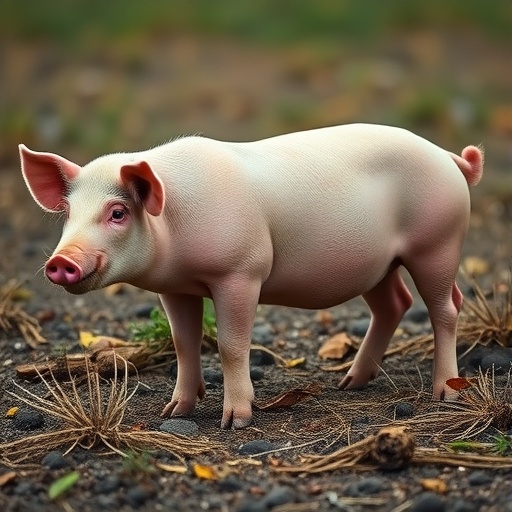In recent years, genomic studies have revolutionized our understanding of animal breeding, particularly in livestock. A novel study led by researchers K.T. Mekonnen, D.H. Lee, and B.C. Beyenssa has added another layer to this narrative, revealing significant genetic variants linked to single-parity reproductive loss in commercial pig breeds. The implications of this research are profound, shedding light on how genetic factors contribute to reproductive performance in pigs, which are a cornerstone of global agricultural systems.
Pigs, revered for their efficiency in converting feed into protein, have become crucial in meeting the demands of a growing population. However, reproductive issues, particularly single-parity losses, have plagued producers, leading to economic setbacks and welfare concerns. The findings from this comprehensive genome-wide association study (GWAS) are poised to challenge current breeding practices, introducing a genetically informed lens through which reproduction can be optimized.
To understand the gravity of the findings, we must first appreciate the methodology employed in the study. A genome-wide association study is an advanced analytical approach that involves scanning entire genomes from numerous individuals to find genetic variations associated with particular traits. In this case, the focus was on single-parity reproductive success among different pig breeds, specifically examining potential genetic markers influencing this trait.
The researchers gathered genetic data from three commercially significant pig breeds, ensuring a robust representation of genetic diversity. By employing high-density single nucleotide polymorphism (SNP) chips, the team meticulously cataloged millions of genetic variants across the genomes of the pigs in question. The precision of this method unlocked previously inaccessible insights into the genetic underpinnings of reproductive traits.
The analysis revealed several SNPs that were significantly associated with reproductive outcomes, particularly focusing on traits related to fertility and litter size. These genetic markers could serve as predictive indicators, allowing breeders to select animals that are more likely to produce successful litters, thus mitigating the impact of single-parity losses. This predictive ability presents a transformative opportunity for the swine industry, which has long sought to enhance reproductive efficiency through selective breeding.
Beyond the immediate implications for breeders, the study also paves the way for further explorations into animal genetics and welfare. Understanding the genetic basis of reproductive loss can lead to improved management practices and better overall herd health. Producers will have the tools to make informed breeding decisions that not only enhance productivity but also promote sustainable animal husbandry.
The study also highlights the importance of collaboration across disciplines in advancing agricultural research. Geneticists, veterinarians, and animal scientists united to tackle a complex issue that affects both animal welfare and agricultural economics. This interdisciplinary approach not only strengthens the findings but also encourages future research efforts to build on the foundation laid by this study.
Moreover, the findings have profound implications for bioinformatics and computational biology. The ability to analyze vast amounts of genomic data presents challenges that require sophisticated algorithms and models. As the field evolves, innovations in data processing and analysis techniques will be paramount in extracting meaningful contributions from genomic datasets.
As we contemplate the broader significance of these findings, it becomes evident that the future of livestock breeding will be defined by an integration of genomic data and traditional breeding practices. This hybrid approach will enable a more nuanced understanding of the complex traits that define livestock health and productivity, ultimately leading to enhanced food security for a burgeoning global population.
The study’s implications extend beyond the confines of commercial pig breeding. Insights gained could inform genetic research in other livestock species, leading to a wider application of the biotechnological advancements in animal breeding. As such, the research may influence strategies employed in cattle, sheep, and poultry industries, revolutionizing reproductive management across the board.
In conclusion, K.T. Mekonnen and colleagues have made significant strides in understanding the genetic factors influencing reproductive performance in pigs. Their findings not only serve the interests of swine producers but also contribute to the broader narrative of sustainable agriculture. By leveraging genomic research to mitigate reproductive losses, stakeholders can embrace a future where enhanced productivity and animal welfare go hand in hand.
Ultimately, the work presented in this study is a vital step toward redefining benchmarks in livestock reproduction and management. By utilizing cutting-edge genomic technologies, the industry can transition towards more scientifically-informed breeding programs that respond to both economic necessities and ethical considerations within animal husbandry.
In the face of global challenges in food production, such research exemplifies how science can lead to innovative solutions, ensuring that agricultural practices remain resilient and forward-thinking in an ever-changing world. Stakeholders must now rally behind these advancements, incorporating genetic insights to build a more efficient and humane agricultural paradigm.
With the ongoing exploration of genetic variants influencing reproduction in livestock, futures are indeed promising—a colorful tapestry of innovation interwoven with science, ethics, and sustainability. The quest for excellence in animal genetics continues, and it is clear that the journey has only just begun.
Subject of Research: Genetic variants associated with single-parity reproductive loss in commercial pig breeds.
Article Title: Genome-wide association study identifies genetic variants associated with single-parity reproductive loss in three commercial pig breeds.
Article References:
Mekonnen, K.T., Lee, DH., Beyenssa, B.C. et al. Genome-wide association study identifies genetic variants associated with single-parity reproductive loss in three commercial pig breeds.
BMC Genomics 26, 1054 (2025). https://doi.org/10.1186/s12864-025-12255-9
Image Credits: AI Generated
DOI: https://doi.org/10.1186/s12864-025-12255-9
Keywords: Genetic variants, reproductive loss, commercial pigs, genome-wide association study, animal breeding, agricultural sustainability, livestock productivity.
Tags: agricultural implications of genetic researcheconomic impact of pig reproductionenhancing pig breeding efficiencygenetic markers for reproductive traitsgenetic variants in pigsgenome-wide association studylivestock genomic studiesoptimizing pig reproductionpig breeding practicesreproductive performance in livestocksingle-parity reproductive losswelfare concerns in animal breeding





